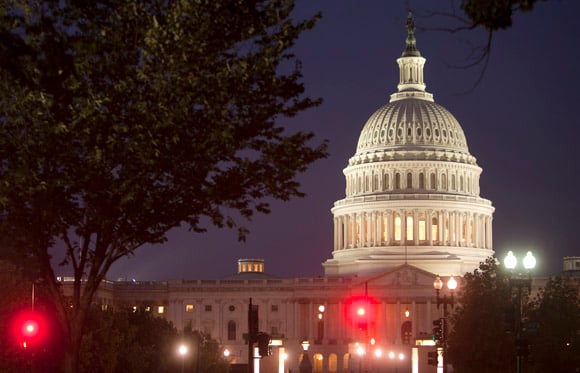Occupy Wall Street protesters are lashing out against what they see as a financial industry luxuriating in wealth created at the expense of the middle class.
Wall Street, however, has its own grievances against Washington, which were on display last week.
Protesters fueling the growing Occupy Wall Street movement are lashing out against what they see as a financial industry luxuriating in wealth created at the expense of the middle class.
The movement also is frustrated with a government that can't or won't address the situation. Wall Street, however, has its own grievances against Washington, which were on display last week.
Mohamed El-Erian, chief executive and co-chief investment officer at Pacific Investment Management Co. LLC, told an audience at the Insured Retirement Institute meeting in Boston that “erratic” policymakers and politicians are creating volatility and uncertainty in the market.
The political brawl over raising the U.S. debt ceiling, which nearly resulted in a default and led to a downgrade of the country's credit rating, illustrates the problem, according to Mr. El-Erian. After the smoke cleared, the massive federal deficit and debt still threatened to undermine the sluggish economy.
“Policymakers have basically been missing in action,” Mr. El-Erian said. “With the exception of central bankers, there has been a strikingly inept response from policymakers.”
David Kelly, managing director and chief market strategist for J.P. Morgan Funds, was more pointed in his criticism. He was contemptuous of lawmakers who sought to burnish their small-government bona fides by asserting that the debt ceiling should not be lifted.
“In my view, these people are not fit for office,” Mr. Kelly said at the IRI conference. Indeed, failure to raise the ceiling could have caused another “Great Depression,” he said.
In some ways, the grousing sounded as though Wall Street might want to occupy Congress — although based on the level of campaign donations, Occupy Wall Street would argue that it already does.
Don't look for Washington anytime soon to produce the decisiveness and clarity for which Wall Street yearns.
The Senate is expected to take up President Barack Obama's jobs bill this week. It contains an important change from Mr. Obama's original proposal. Instead of a series of tax deduction and exemption limitations for the wealthy, it would impose a 5.6% surcharge on taxpayers earning more than $1 million annually.
This $447 billion stimulus and deficit reduction plan has little prospect of emerging from Congress intact.
In fact, despite Mr. Obama's attempts to channel Harry Truman by running against what he calls a do-nothing Congress, several Senate Democrats have expressed misgivings about his jobs measure. The House Republican majority has already said it won't consider the Obama bill in its entirety.
Next month brings a moment of truth for the bipartisan deficit reduction committee, which was established by the bill that raised the debt ceiling.
By Nov. 23, it must produce a proposal that cuts at least $1.2 trillion from the federal deficit over the next 10 years. It also can offer tax reform provisions. Congress must vote on the package, if one is produced, by Christmas or else $1.2 trillion in automatic spending cuts go into effect.
Prospects for the committee are muted. The six Republicans and six Democrats on the panel may not be able to stray far enough from positions staked out by congressional leadership to achieve a breakthrough.
“It is highly unlikely this committee will come up with a meaningful plan on deficit reduction,” Andrew Friedman, principal at The Washington Update, told the IRI conference.
Such pessimism also is reflected in the investment advice sector.
“I don't know of one client who believes that the bipartisan debt committee will come up with ideas that will actually be enacted,” said John Ritter, co-owner of Ritter Daniher Financial Advisory LLC.
What is certain is that over the next few months, Republicans and Democrats will hone their talking points on tax and fiscal policy, which they will brandish in next year's elections.
But not even 2012 will sort things out, if Mr. Obama keeps the White House and, as predicted, Republicans take over the Senate and hold on to their House majority. However, even if the GOP captures the Senate, they won't obtain the 60-vote majority required to overcome filibusters.
“No matter what happens with the presidency, the Democrats still have a seat at the table,” Mr. Friedman said. “I don't think this election changes that much, when it comes to the deficit.”
That means Washington will continue to give Wall Street plenty to complain about.







